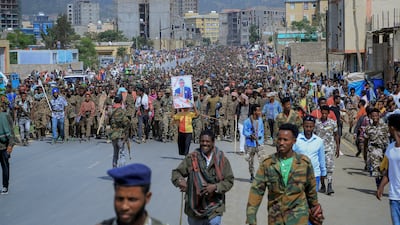US Secretary of State Antony Blinken spoke with Sudanese Prime Minister Abdalla Hamdok about the fighting in Ethiopia’s northern Tigray region on Wednesday, amid fears the widening conflict will worsen suffering and tear the fragile country apart.
The two men expressed concern over the “expansion of armed confrontation” beyond Tigray’s borders into the nearby Amhara and Afar regions and reports of Eritrean forces rejoining the conflict, the US State Department said.
Tigrayan rebels are now on the offensive after mounting a stunning recapture of their northern territory, which was attacked in November by government troops, ethnic Amhara militants and forces from neighbouring Eritrea.
Mr Blinken and Mr Hamdok said they would encourage the various forces to lay down their guns, work towards a deal that stops Ethiopia from splintering and grant aid workers access to famine-stricken populations.
During a visit to the region, US aid chief Samantha Power on Tuesday urged Tigrayan rebel forces to “immediately” withdraw from the Amhara and Afar regions, and called for a general ceasefire as displacement continues and a devastating famine looms.
“If aid is to reach people in need in Tigray, then ALL parties must end hostilities,” Ms Power, administrator of USAID, said on social media.
“There is no military solution to this conflict.”
Tigray has been in the throes of a humanitarian crisis for months, with hundreds of thousands of people suffering from famine, the UN has reported, while access to aid to the northern region remains hobbled by delays and bureaucratic hurdles.
The humanitarian crisis deepened this week when Ethiopian Prime Minister Abiy Ahmed's government suspended two aid groups active in Tigray for three months, accusing them of spreading false information.
Ethiopia said the Dutch section of Doctors Without Borders and the Norwegian Refugee Council had been “disseminating misinformation on social media and other platforms”.
The suspension sparked condemnation from the US and the UN, with the world body’s top humanitarian Martin Griffiths warning Ethiopian authorities that “blanket accusations” against aid workers were “dangerous” and must stop.
Mr Griffiths spoke to reporters amid a new push to bring more food and other aid into Tigray.
Linda Thomas-Greenfield, Washington’s envoy to the UN, said the suspension was “unacceptable”.
Tigray was thrown into violence in November when Mr Abiy sent troops to overthrow the ruling Tigray People's Liberation Front (TPLF) in response to what he said were attacks by the group on federal army camps.
Mr Abiy, a Nobel Peace Prize laureate, declared victory within weeks after government forces took the Tigray capital Mekelle, but TPLF leaders remained on the run and fighting continued.
In a stunning reversal of the conflict in late June, pro-TPLF forces re-entered Mekelle, Mr Abiy declared a unilateral ceasefire and the army mostly pulled out of Tigray. The rebels then pushed on into Amhara and Afar, displacing tens of thousands of people.
Washington has traditionally seen Ethiopia as a key partner in countering terrorism running development projects in the turbulent Horn of Africa, but the Biden administration has been openly critical of the Tigray war.
Mr Blinken said in March that ethnic cleansing was unfolding in western Tigray. In May, he slapped travel bans on some Ethiopian and Eritrean officials accused of fuelling the conflict.
Mr Abiy has said his ceasefire in June was intended to ease the delivery of humanitarian assistance, but aid workers say access is as bad as ever, with the UN repeatedly warning that aid vehicles cannot access Tigray.







